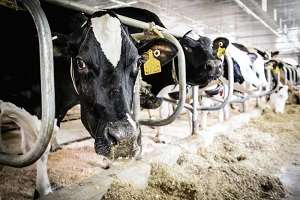By Sam Million-Weaver
Wisconsin is known as America's dairyland—more than one third of all the cows in America live on some-3,000 farms in the state. Those bovine residents contribute to a thriving dairy industry, but milk is not the only thing that they produce in prodigious quantities. That many cows inevitably leads to a significant amount of manure, and managing that organic waste is an important problem for everyone living in the state.

"It is a horribly complex problem and we all contribute to it and are affected by it," says Victor Zavala, the Richard H. Soit Assistant Professor in chemical and biological engineering at the University of Wisconsin-Madison. "Farms generate the manure and we are all affected by its environmental impacts. But manure production is driven by strong economic forces originating from urban areas that demand dairy products."
Phosphorus runoff from manure causes algal blooms in water bodies. Manure also releases pathogenic bacteria and methane gas. Technologies do exist to process organic waste, while at the same time recovering valuable products such as biogas and struvite for fertilizer; but these technologies are expensive and affordable only for large farms.
Yet, deciding on a suitable solution involves much more than technology cost alone: Where to locate manure processing plants, how to transport the waste, and who should pay for the equipment are all challenging questions. With so many competing interests, no single individual can realistically keep track of all the costs, benefits, and constraints. "This problem is too complex. You need to find simpler and more direct ways to explain the interactions between social, economic and technology aspects to people making decisions," says Zavala.
Conflicting stakeholder interests complicate the problem further; most of the time such conflicts arise unnecessarily because of a lack of data about technology and logistical constraints.
A decision-making framework can help people to better grasp the large number of factors that need to be considered and to narrow down the options to a few potential solutions—and Zavala and his colleagues are developing such a framework to help people reach agreements in complex and potentially controversial decisions such as manure management. By systematically quantifying costs, environmental impacts, and people's opinions and priorities, these tools can help lead to compromise solutions that maximize collective stakeholder satisfaction.
With support from the U.S. Department of Agriculture, the National Science Foundation, the U.S. Environmental Protection Agency, and Dane County in Wisconsin, Zavala is creating decision-making frameworks that government and industry can use to identify optimal strategies to tackle the manure management problem.
"We are hoping that with this framework, we can have a more informed negotiation process. Instead of just telling stakeholders what they should do, we want to provide better frameworks for people to negotiate on what the manure management infrastructure would do," says Zavala, who is leading the effort along with Rebecca Larson, an assistant professor of biological and systems engineering at UW-Madison.
Click here to see more...